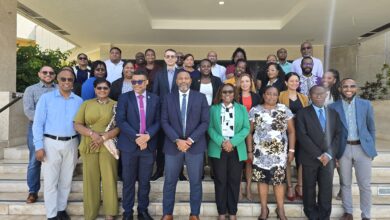The Seventh Meeting of the Council for Human and Social Development (COHSOD) was held at Le Meridien Pegasus, Georgetown, Guyana on 23- 25 October 2002.
The Hon. Walter Sandriman, Minister of Education and Community Development, of the Republic of Suriname and Chairman of the COHSOD, presided over the proceedings.
Other Ministers in attendance were the Hon Melanie Griffin, Minister of Social Services and Community Development, The Bahama; The Hon. Gracia Balderamos, Minister of Human Development, Women, Children and Civil Society, Belize; Hon Roosevelt Skerrit, Minister of Education, Sport and Youth Affairs, Dominica; the Hon Gail Texeira, Minister of Culture, Youth and Sports, the Hon Bibi Safora Shadick, Minister in the Ministry of Labour, Human Services and Social Security, the Hon Leslie Ramsammy, Minister of Health, the Hon Henry Jeffrey, Minister of Education, and the Hon Ronald Gajraj, Minister of Home Affairs, Guyana; the Hon Emanuel Rupert Herbert, Minister of Social Development, Community and Gender Affairs, St Kitts and Nevis; the Hon Jon S Odlum, Acting Minister of Health, Saint Lucia; the Hon Clayton C.F. Burgin, Minister of State, Education, Youth and Sport, St. Vincent and the Grenadines and the Hon Clarence Selver, Minister of Health, Education, Youth, Sport and Gender Affairs, Turks and Caicos Islands.
The Governments of Barbados, Grenada, Jamaica, and Trinidad and Tobago were represented by High Level Officials. In addition, a number of Regional and International Agencies and Regional NGOs were in attendance.
OPENING CEREMONY
The Opening Ceremony was chaired by Dr Edward Greene, Assistant Secretary-General, Human and Social Development, Caribbean Community Secretariat. The Meeting heard addresses from Dr Carla Barnett, Deputy Secretary-General, Caribbean Community; the Hon Clayton Burgin, Minister of State, Education, Youth and Sport Affairs, the Outgoing Chair, St Vincent and the Grenadines, the Hon Gail Texeira, Minister of Culture, Youth and Sports and Minister of Foreign Affairs (Ag.), Guyana, the Hon Walter J Sandriman, Minister of Education and Community Development, Incoming Chair, Suriname.
Dr Carla Barnett in opening the Meeting offered a warm and collegial welcome to delegates. She noted that the COHSOD was taking place against a backdrop of, inter alia, economic slowdown, a high incidence of HIV/AIDS and the increasing level of violent crime. However, she added on a brighter note that decisions made and actions taken by a number of Community Organs to address the challenges being faced by the Region were already bearing fruit. She expressed the hope that the Working Groups of the COHSOD VII would enable the development of an implementable and successful Human and Social Development strategy. In particular, she welcomed the Bureau of the CARICOM Youth Ambassadors and the Caribbean Federation of Youth (CFY) representative to the Meeting and noted that their input would be important to the strategic planning of the Meeting.
The Hon Clayton Burgin noted that the Region was advancing in its integration movement, particularly with efforts made towards finalising arrangements for the CSME, including the signing of the Agreement Establishing the Caribbean Court of Justice. He expressed the appreciation of the Government of St Vincent and the Grenadines for its experience as Chair of the COHSOD between October 2001 and October 2002. He also attested to the strong leadership of the CARICOM Secretariat in addressing the challenges in the Directorate of Human and Social Development, in particular the need to combat the growing incidence of HIV/AIDS, the rising level of crime and violence, and the need to include in policy decisions the critical mass of youth, and indeed the wider civil society.
He encouraged Governments, the private sector and Non-Governmental Organisations (NGOs) to support the Secretariat in its implementation processes.
The Hon Gail Texeira discussed the threats to democracy in the Region, such as increased narco-trafficking , unemployment, crime and violence. She noted the need to analyse issues on a cross-cutting, inter-sectoral basis in order to move forward. Stressing the need for a regional entity where there is a respect for the roles of Government and Civil Society, she advocated a holistic approach to addressing Community issues. Finally, she underscored the need for this process to begin with youth and their education to grapple with these issues. She looked forward to a new urgency and energy in the COHSOD which she saw as necessary to complete the difficult tasks assigned.
Dr Edward Greene in his presentation urged Member States to implement their national COHSODs as a key tool for development. He discussed the various elements of the COHSOD Agenda on Human and Social Development for 2002-2003, including the twin pillars of Caribbean Cooperation in Health and the Pan-Caribbean Partnership on HIV/AIDS. He stressed the importance of the development of a Caribbean Human and Social Development Strategy, as an integrated, inter-sectoral, sustainable development approach to addressing a number of issues essential for the advancement of the Community. In particular, he underlined the need to collaborate with groups which would normally be marginalised in such a process.
The Hon Walter Sandriman in his address as Incoming Chair assured the Meeting of the commitment of the Government and people of Suriname to the success of the COHSOD. He added that there was a need for all stakeholders to fully understand the functioning of the Caribbean Community in order to complete those tasks necessary for advancement towards the CARICOM Single Market and Economy (CSME) and beyond. He noted that the global playing field of liberalisation was not even and that the CSME appeared to be the best hope for the Region to survive in this environment. He urged Member States to put National Accreditation Bodies and other organs in place to facilitate the free movement of skills as a part of the rights of CARICOM Nationals set out under the CSME. He noted the pressing issues included in the Agenda and wished the Meeting
DEVELOPING A HUMAN AND SOCIAL DEVELOPMENT STRATEGY (HSD)
Based on a proposal from the Futures Policy Group comprising a group of recognized experts led by Professor Denis Benn, Manley Professor of Public Policy, UWI, the COHSOD agreed, inter-alia, on a scheme for developing the strategy based on three elements, the core (education, health and labour) the complementary (crime and reduction policies, sport) and the cross cutting (gender, youth and culture).
It was agreed that the HSD strategy should take into consideration:
(i) the OECS Human Development Report which provides a useful model in so far as it modifies the human development index originally put forward by the UNDP in the 1980s and moves toward the development of a vulnerability index;
(ii) The multicultural issues based on a series of activities being coordinated by the Directorate of HSD including Technical and vocational education Early Childhood development Technology Education and language training;
(iii) The Caribbean HIV/AIDS Training (CHART) Initiative which provides a useful model for training health and other related professional to deal with care and treatment of PLWA
(iv) The model developed from the Task Force on Gender which embarked on an interesting project illustrating how gender can be mainstreamed into the core HSD areas, education, health and labour.
It was noted that the work of the Futures Policy Group is dependent on funding for the suggested programmes arising out of the recommendations of the Working Groups.
YOUTH AGENDA
The COHSOD agreed to support the CARICOM Youth Ambassadors programme and approved of the priorities established for advocacy in the 2002-2003 period in the areas of HIV/AIDS, the reduction of crime and the use of illicit drugs, and environmental protection.
The COHSOD also recommended that the proposals for consultation between the CARICOM Youth Programme, CYP, UNFPA, UNICEF and other agencies be organized as soon as possible in order to reduce the unnecessary duplication of effort; and to collectively help to strengthen the national youth programmes so that all of these initiatives can meaningfully contribute to both national and regional development.
THE FOLLOW UP TO THE SPECIAL SESSION ON THE RIGHTS OF THE CHILD
The COHSOD approved the recommendations coming out of the Special Meeting of Ministers with responsibility for Children and, agreed that these recommendations be incorporated in the work of the Futures Policy Group on HSD strategy.
In addition, it identified specific areas for follow up especially those dealing with health and nutrition and early childhood education.
FREE MOVEMENT OF SKILLS
Resolving the issues on accreditation, movement of skills and the facilitation of travel for CARICOM citizens are critical to the sustainability of the CSME. Among the major decisions from the COHSOD are:
(i) the Secretariat to do an inventory of the requirements to obtain citizenship in the various Member States and similarly to obtain economic citizenship;
(ii) Member States to provide information on the full operationalisation of the free movement of the approved categories, including legal, regularity, procedural and administrative arrangements;
(iii) Member States to start to remove restrictions in accordance with the Programme for the Removal of Restrictions as approved by the Conference;
(iv) Continue to support the determination of the Conference that there should be a CARICOM passport;
(v) Member States should by July 2003 accept machine readable id-cards for intra-regional travel;
(vi) Common E/D form for introduction in all Member States by July 2003.
CRIME AND SECURITY AND DEMAND REDUCTION FOR DRUGS
These issues informed one of the main Agenda Items discussed both in the Plenary Session and in the Working Groups. The COHSOD learnt of the proposals and recommendations from the Report of the Task Force on Crime and Security established by the Conference of Heads of Government and also of the Draft Regional Demand reduction Strategy coordinated by the CARICOM Secretariat in collaboration with CAREC.
Among the main recommendations from the COHSOD was the need to establish National and Regional Commissions on Crime and Drugs that are multi-sectoral and include Civil Society representatives; joint regional surveillance and information sharing; and, placing greater emphasis on utilising a series of multi-cultural initiatives involving culturally relevant messages and interventions of faith-based organisations, the private sector, schools and the media, anchored in evidenced-based material.
PAN-CARIBBEAN PARTNERSHIP ON HIV/AIDS
Deeply concerned by the increasing impact of HIV/AIDS epidemic in the Caribbean region and the high level of vulnerability of our social (and economic) sectors, the Meeting concurred with and expressed the urgent need to rapidly “Scale up” our responses in a more coordinated and sustainable manner. In this context, the Meeting supported the Pan-Caribbean Partnership (PANCAP) under the leadership of CARICOM as an appropriate coordinating mechanism.
Further the Meeting recognised (and applauded) the work of PANCAP and its critical role and influence in the Region'>s fight against HIV/AIDS.
And recognised as well the need for the appropriate level and scale of involvement of all key stakeholders especially those of strategic importance to the national programmes.
Recommends that the CARICOM Secretariat makes every effort to:
(i) Strengthen the PANCAP as a platform within the CARICOM Secretariat for the coordination of regional and national contributions;
(ii) Expand the membership of PANCAP and appropriately configures its structure and functions to ensure the widest possible representation and participation of the institutions and peoples of the Caribbean;
(iii) Review the existing regional HIV/AIDS project and proposal with a view to including suitable representation from “Additional” institutions;
(iv) Ensure that subsequent regional HIV/AIDS plans and projects have the widest possible ownership and involvement of the Caribbean.
PRESENTATION OF CARIFESTA VIII
The Eighth Caribbean Festival for the Arts (CARIFESTA) will be held in Suriname during the second half of next year. The host country, which holds the regional quasi-cabinet portfolio for Culture is going all out to ensure the success of the Festival scheduled for 25-30 August 2003.
Under the slogan “Many Cultures: The Essence of Togetherness – The Spirit of the Caribbean”, CARIFESTA VIII promises to be a stimulating and exciting occasion for regional as well as overseas visitors and is expected to feature a wide range of activities, focusing on new as well as traditional areas of culture.
A delegation from Suriname, headed by Hon. Walter Sandriman, Minister of Education and Community Development made a Special Presentation to Members of the COHSOD, The Diplomatic Corps, the Media and Special invitees at a Ceremony held during the Seventh Meeting of the COHSOD in Georgetown, Guyana on 25 October 2002.
Among the highlights of the Presentation were the unveiling of the CARIFESTA VIII Logo as well as the introduction of the Slogan and the CARIFESTA Tune.
There are great expectations for the August 2003 Festival, and following the tradition of previous CARIFESTAs, it is anticipated that the unique nature of the Region's cultural heritage will be showcased through full participation of Member States of CARICOM and the Association of Caribbean States (ACS) and other neighbouring countries.





